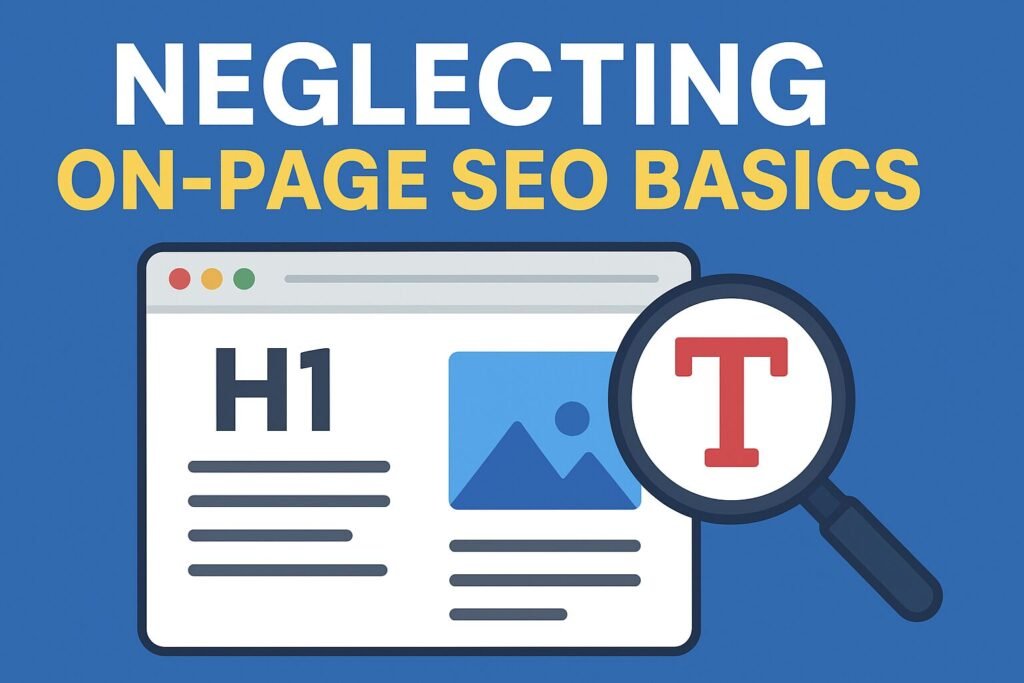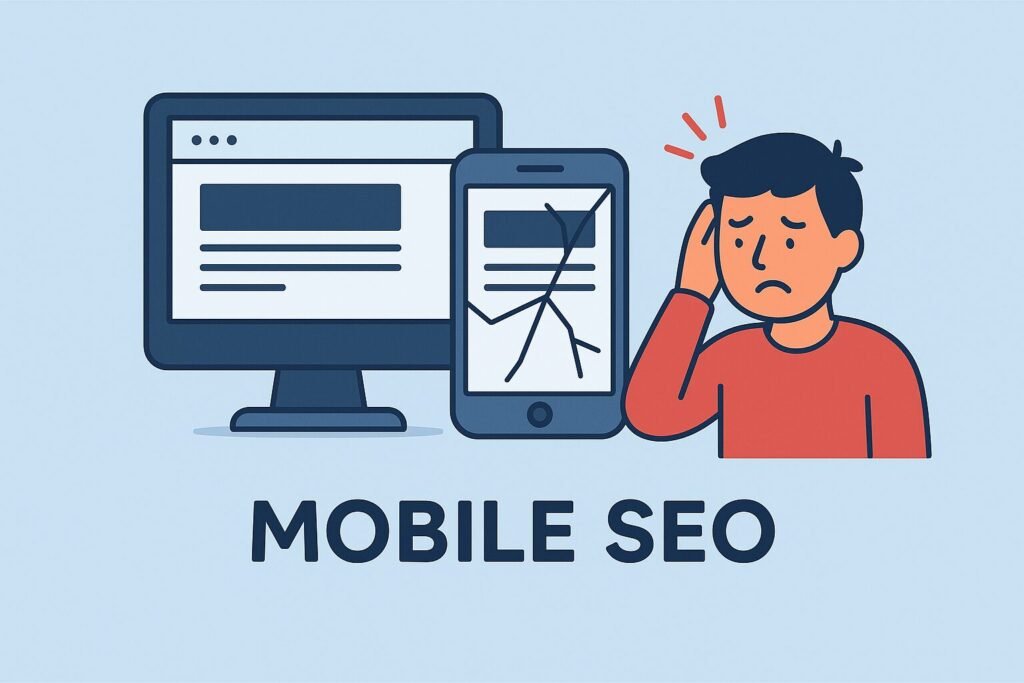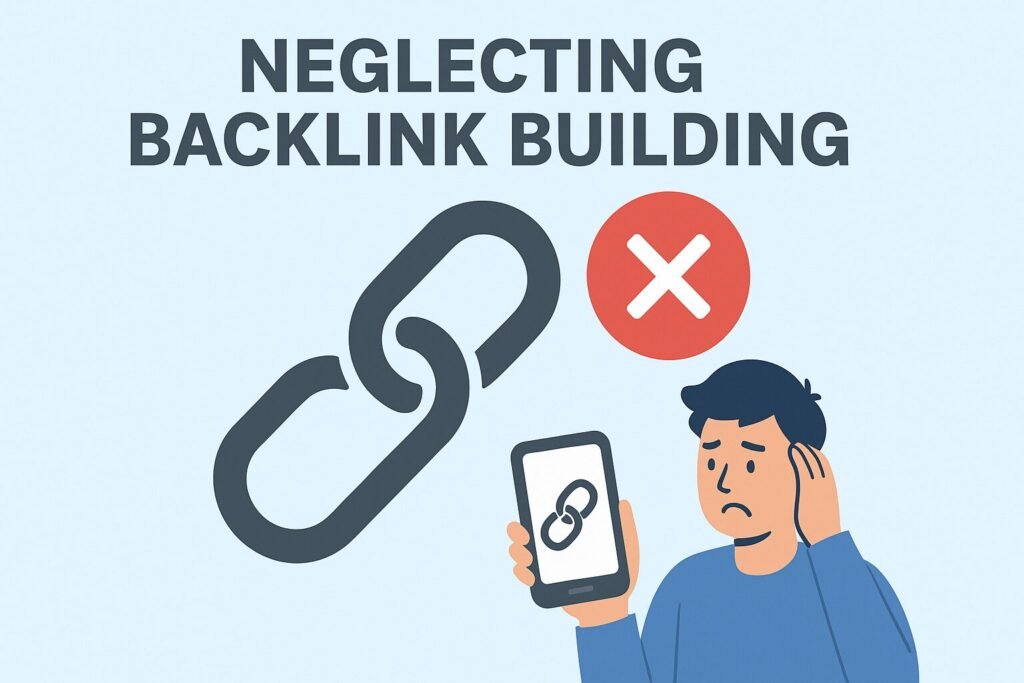Search Engine Optimization (SEO) is the heartbeat of online visibility. Whether you run a blog, an e-commerce store, or a business website, SEO decides if your site appears on Google’s first page or gets buried under a sea of competitors.
But here’s the catch—many people spend months on SEO, only to see little or no results. Why does this happen? Most of the time, the culprit is simple: avoidable SEO mistakes that silently kill rankings and traffic.
According to SEMRush, SEO mistakes—whether they’re technical SEO issues or on-page SEO missteps—can hurt your ability to rank on Google.
If you’ve been wondering, “Why isn’t my website ranking even though I’m working hard on SEO?”—this article is for you. Let’s dive into the most common SEO mistakes, why they harm your site, and practical solutions to fix them.
1. Ignoring Keyword Research
Keyword research is the foundation of SEO. Skipping it is like building a house without a blueprint.
Why It’s a Mistake
- Targeting highly competitive keywords makes it almost impossible to rank.
- Ignoring long-tail keywords means missing out on easy-to-rank, conversion-focused terms.
- Choosing keywords without analyzing search intent leads to irrelevant traffic that won’t convert.
How to Fix It
- Use tools like Google Keyword Planner, Ahrefs, or SEMrush to discover opportunities.
- Target a mix of long-tail and medium-competition keywords.
- Match keywords to intent: Are users looking for information, products, or services? Create content accordingly.
2. Keyword Stuffing

Gone are the days when repeating a keyword 20 times boosted rankings. Today, keyword stuffing is one of the quickest ways to get penalized by Google.
Why It’s a Mistake
- Google’s algorithms easily detect keyword abuse.
- Overstuffing kills readability, making content robotic.
- It sends a red flag to search engines that your content is manipulative.
How to Fix It
- Use keywords naturally—once in the title, intro, headings, and a few times in the body.
- Sprinkle in LSI (Latent Semantic Indexing) keywords and synonyms.
- Always write for humans first, algorithms second.
3. Publishing Poor Quality Content
SEO isn’t just about keywords; it’s about value delivery. Thin, duplicated, or low-quality content can destroy your rankings.
Why It’s a Mistake
- Google prioritizes helpful, authoritative content.
- Poor articles lead to high bounce rates and low engagement.
- Duplicate or spun content risks manual penalties.
How to Fix It
- Publish well-researched, original, in-depth content.
- Regularly update older posts to stay relevant.
- Ensure every blog solves a real problem or question.
💡 Pro Tip: Aim for content that satisfies the “E-E-A-T” principle—Experience, Expertise, Authoritativeness, and Trustworthiness.
4. Neglecting On-Page SEO Basics

On-page SEO might look small, but it makes a big impact. Skipping it means losing rankings you could have easily won.
Common On-Page SEO Mistakes
- Missing or duplicate title tags.
- Poorly written meta descriptions.
- Ignoring H1, H2, H3 headings.
- Weak internal linking structure.
How to Fix It
- Write unique, keyword-optimized titles and meta descriptions.
- Use headings to organize content logically.
- Build an internal linking system (link to related posts/pages).
- Optimize images with alt text and compression.
5. Slow Website Speed
In today’s fast-paced world, no one waits for a slow site. Google considers speed a ranking factor through Core Web Vitals.
Why It’s a Mistake
- Every extra second of delay reduces conversions by up to 7%.
- Mobile users leave instantly if a page takes longer than 3 seconds.
- Core Web Vitals directly influence rankings.
How to Fix It
- Use a lightweight WordPress theme and limit plugins.
- Enable browser caching and image compression.
- Upgrade to faster hosting.
- Test with Google PageSpeed Insights and GTmetrix.
6. Not Optimizing for Mobile

Since Google moved to mobile-first indexing, your mobile site is now your main site in Google’s eyes.
Why It’s a Mistake
- Non-responsive designs drive away mobile users.
- Google ranks based on mobile experience first.
- Difficult navigation kills engagement.
How to Fix It
- Use a responsive WordPress theme.
- Test across different screen sizes and devices.
- Keep menus thumb-friendly and navigation simple.
7. Ignoring Technical SEO
Technical SEO is like the engine under the hood. Without it, search engines can’t crawl or index your site properly.
Common Technical Mistakes
- Broken links and 404 errors.
- Poorly structured XML sitemap.
- Incorrect or missing robots.txt file.
- Duplicate content due to canonical errors.
How to Fix It
- Run regular audits with Screaming Frog or Ahrefs Site Audit.
- Fix crawl errors and redirect broken links.
- Submit updated sitemaps to Google Search Console.
8. Ignoring User Experience (UX)
Google has made it clear—user experience is SEO. A clunky, confusing site won’t rank well.
Why It’s a Mistake
- Poor design increases bounce rates.
- Hard-to-use navigation frustrates visitors.
- Annoying pop-ups reduce engagement.
How to Fix It
- Use a clean, simple layout with clear navigation.
- Improve readability with short paragraphs, bullet points, and visuals.
- Add engaging CTAs without being intrusive.
9. Neglecting Backlink Building

Backlinks are still one of the strongest Google ranking factors. Ignoring them—or using spammy tactics—can stall your growth.
Why It’s a Mistake
- Without backlinks, you can’t outrank competitors.
- Buying links or joining link farms risks severe penalties.
- Poor link diversity signals manipulation.
How to Fix It
- Use white-hat strategies: guest posting, PR outreach, collaborations.
- Publish share-worthy content (guides, case studies, infographics).
- Build relationships with industry influencers and bloggers.
10. Not Tracking Analytics and SEO Audits
SEO isn’t a one-time task—it’s an ongoing process. Skipping analytics is like driving blindfolded.
Why It’s a Mistake
- You won’t know which strategies are working.
- Ignoring data wastes time and effort.
- Competitors who analyze metrics gain the advantage.
How to Fix It
- Use Google Analytics to track traffic and conversions.
- Monitor keywords via Google Search Console.
- Run regular SEO audits and refine strategy.
Conclusion
SEO is powerful, but small mistakes can ruin months of effort. By avoiding the pitfalls we discussed—keyword stuffing, poor content, neglecting mobile, ignoring technical SEO—you set yourself up for sustainable rankings and long-term traffic growth.
You can also check this article, for improving your Keyword Research.
Remember:
- SEO is not about quick hacks—it’s a long-term investment.
- Focus on user-first content and technical foundations.
- Keep testing, auditing, and improving.
If you consistently avoid these SEO mistakes, your website will not only climb the rankings but also attract engaged visitors who convert into loyal customers.
Frequently Asked Questions (SEO + Schema Ready)
Q1. What are the biggest SEO mistakes beginners make?
Most beginners ignore keyword research, overuse keywords, and skip technical SEO.
Q2. Can slow website speed hurt SEO rankings?
Yes, slow speed increases bounce rates and negatively impacts Google Core Web Vitals, which are ranking factors.
Q3. How important are backlinks in 2025?
Backlinks remain one of the strongest ranking signals, but quality matters far more than quantity.
Q4. What is the easiest SEO mistake to fix?
Updating title tags, meta descriptions, and internal links can be fixed quickly and show results fast.
